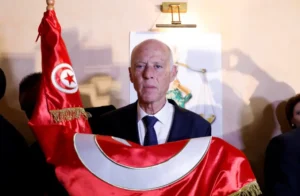The right of the Palestinian people to their stolen land and the establishment of their state over it after its liberation, with Al-Quds Al-Sharif [Jerusalem] as its capital,” the constitution reads.

The new Tunisian constitution, which passed in a referendum on Tuesday, enshrines the right for Palestinians to establish a state in the Levant with Jerusalem as the new country’s capital.
“We defend the legitimate rights of the peoples who, according to this legitimacy, have the right to decide their own destiny, the first of which is the right of the Palestinian people to their stolen land and the establishment of their state over it after its liberation, with Al-Quds Al-Sharif [Jerusalem] as its capital,” reads the preamble of the new constitution.
Pro-Israel blogger Elder of Ziyon, who first reported the inclusion of the passage on Wednesday, asserted that the phrase “stolen land” supports “Palestinian claims to all of Israel.”
Tunisia’s 2014 constitution also had a passage in support of Palestinians, saying the state would support “all justliberation movements, at the forefront of which is the movement for the liberation of Palestine.”
“The right of the Palestinian people to their stolen land and the establishment of their state over it after its liberation, with Al-Quds Al-Sharif [Jerusalem] as its capital.”
2022 Tunisian Constitution
Constitutional referendum
The constitution, which passed with the support of 90%-95% of the 27.5%-30.5% of Tunisian citizens who turned out for the vote, is controversial also for what critics say is a move toward autocracy.
The constitution includes changes that shift power away from parliament to the presidency, The Media Line reported on July 6.
The referendum did not require a minimum turnout to be approved.
Opposition groups boycotted the Monday referendum, claiming that President Kais Saied is staging a coup and overthrowing the democracy that arose from Tunisia’s Arab Spring uprising of 2011.
“Saied falsified the popular will by falsifying the results,” said Nejib Chebbi, head of the opposition National Salvation Front, according to Reuters.
Saied responded to boycotts by saying that it “would have been better if they had taken part.”
The Tunisian parliament was dissolved by Saied in March, eight months after he suspended it and took full executive power. He has been ruling by decree in a state of emergency since dismissing the government.
Reuters and The Media Line contributed to this report.
